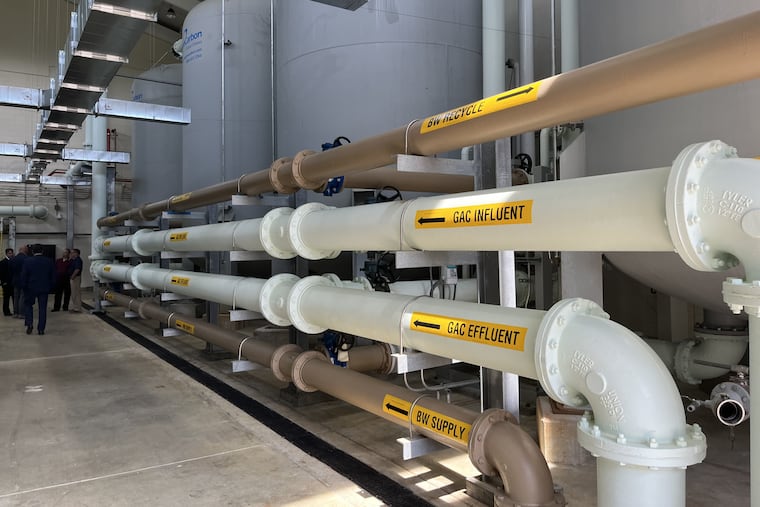Two South Jersey towns — one urban, one suburban — show how millions from the federal infrastructure law might be used
“We are seeing more money coming back to our communities, specifically this county (Camden), than ever before,” said U.S. Sen. Cory Booker.

In Camden, they plan to dig up Elijah Perry Park and renovate it with new basketball courts, a baseball diamond, a soccer field, a playground, and a gazebo at a cost of about $3 million.
In Moorestown, they’ve already expanded and upgraded the North Church Street Water Treatment Plant, once closed after a contaminating industrial solvent was found in a well. The cost: nearly $20 million.
Federal, state, and local officials on Friday announced funds that will pay for excavation of the Camden park and provide zero-interest financing for the Moorestown plant. They say it’s a glimpse of what’s to come as money starts to flow from the $1 trillion bipartisan infrastructure law signed late last year by President Joe Biden.
Camden received $3.5 million, out of $6.5 million the U.S. EPA has set aside for brownfields projects in New Jersey out of the infrastructure law.
The money comes from $1.5 billion allocated under the law for environmental justice, economic revitalization, and cleaning up contaminated properties. Overall, the law set aside $254.5 million in brownfields grants to 265 U.S. communities.
The chunk given to Camden will go to the Camden Redevelopment Agency, which will use part of that money to clean up Elijah Perry Park in South Camden.
Joe Myers, COO of the Camden Community Partnership, formerly Cooper’s Ferry Partnership, said the park is considered contaminated because of the “old fill” that was used to build it, though there are no known toxins at the site. As a result, the park will be torn down, and that fill will be excavated and replaced with clean fill over the course of a year at a cost of about $800,000, Myers said. His group is a partner on the project.
The remaining $2.7 million from the $3.5 million the Camden Redevelopment Agency received will be split for cleanups at five other locations. The park itself will be paid for out of a mix of other funds.
“Now this EPA funding will also help leverage millions of dollars in new investments like the renovation of this park, Elijah Perry Park, and more,” said Camden Mayor Victor Carstarphen.
“We are seeing more money coming back to our communities, specifically this county [Camden], than ever before,” said Sen. Cory Booker (D., N.J.).
» READ MORE: New Jersey is getting $1B for water infrastructure, but asks: Will anyone come and get it?
In Moorestown, Mayor Nicole Gillespie said the township’s North Church Street Water Treatment Plant had to be shut down six years ago because of contamination. The plant reopened several years ago and now filters out the contaminant 1,2,3-trichloropropane and 1,4-dioxane. The plant draws from a well 400 feet deep and pumps up to 3 million gallons of clean water a day.
Though the township council undertook the plan to rebuild the plant, it had to do so through loans.
On Friday, the EPA announced $221 million in water infrastructure help for New Jersey. Addressing antiquated drinking water infrastructure is one of the key goals of the Biden administration through the infrastructure bill.
» READ MORE: New Jersey is getting $1B for water infrastructure, but asks: Will anyone come and get it?
The state’s Infrastructure I-Bank will lend the money to community water departments for improvements to treatment plants, pipes, and other drinking water infrastructure.
Moorestown will receive a $19.85 million, zero-interest loan to pay off the plant, saving taxpayers about 30% in other interest it would have paid out on short-term notes.
“This is some of, if not the, cleanest water in the state,” Gillespie said of the water now filtered at the plant, calling it one of the largest investments in water infrastructure in the township’s history. “... Not only does it provide our residents with clean water, but it allows us as the local governing body to maintain control of the quality of that water and the pricing. So the investment was worth it.”
This article has been corrected to state that Moorestown’s North Church Street Water Treatment Plant filters out 1,4-dioxane, not dioxin.